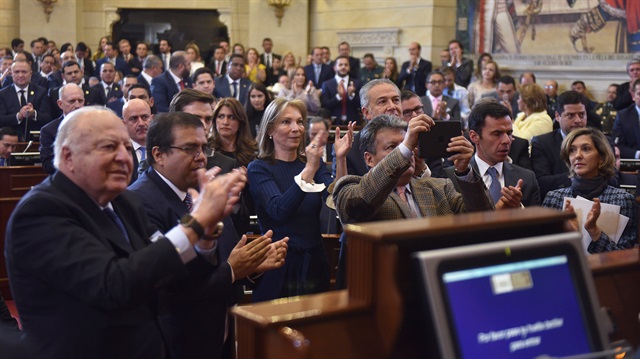
Colombia's former Farc guerrillas will have 10 seats in Congress for the first time since the guerrilla movement was formed in 1964.
A peace agreement with the Colombian government signed in 2016 granted the rebels legislative representation and ended their struggle for power. It was believed to be the final chapter of a half-century of civil struggle widely recognized as the longest-running conflict in the Western Hemisphere.
But the Farc´s path to Congress has not been an easy road.
It had to deal with widespread popular anger and faced fierce opposition from the center-right and right of the political spectrum. Right-wing politicians had constantly criticized the seats that the peace agreement granted to the Farc, highlighting that those who perpetrated war crimes should not be able to participate in politics without first being prosecuted.
The peace accord gave Farc members amnesty for crimes committed before the signing of the deal. Previous convictions were handed down by courts allowing the group’s leaders to participate in politics and run for public office once they handed in their guns. However, any legal violations committed after the agreement will be prosecuted under the ordinary legal system.
But the former guerrillas have faced judicial challenges since the agreement was signed. The U.S. Justice Department has requested the extradition of one Farc leader, Zeuxis Pausias Hernández, AKA Jesus Santrich, for drug trafficking offences, meaning he will be unable to occupy his position in Congress. Santrich has not been extradited but remains in custody in Colombia and was not allowed to take possession of his seat in the House of Representatives.
Santrich’s detention on April 9, 2018 triggered a political storm. Consequently, Ivan Marquez, another prominent Farc leader, withdrew from his seat, arguing that the government had breached the agreement.
The Farc´s representation in Colombian political life was a central discussion during the peace negotiations which took place in Havana, Cuba. As a result, the group was granted 10 seats in Congress, five in the Senate and five in the House of Representatives. The rebels had to become a political party.
In 2017, after the signing of the peace agreement, the guerrillas formed a political party retaining their infamous acronym: Farc. However, they removed the armed element of the name and changed it from the Revolutionary Armed Forces of Colombia to the Revolutionary Alternative Force of Colombia -- a decision that some claim was a political mistake, as it did not disenfranchise the new party from its violent guerrilla past.

Despite keeping its old name, the Farc tried to rebrand itself as a political party focused on fighting corruption with a social reform agenda rather than as a revolutionary party. A group of prominent members were presented to be elected to Congress. The former guerrilla leader Rodrigo Londoño, AKA Timochenko, was elected to be presidential candidate and a group of prominent members were presented to participate in Congress.
Even with their seats guaranteed in Congress, Farc members decided to participate in legislative elections to prove their popularity. On March 11, 2018, they suffered a mauling after winning less than one percent of the vote. Londoño also withdrew his presidential candidacy after suffering health issues.
The Havana peace agreement created a transitional justice system to investigate and prosecute war crimes committed during the conflict and to hand down alternative sentences to the guerrillas and military members who presented themselves to the new tribunal.
But implementing the transitional justice system has been a legislative and bureaucratic nightmare. Congress did not implement it within the necessary timetable for it to become functional before the new legislative term. Accordingly, Farc members selected to occupy congressional seats were unable to attend the tribunal.
The right-wing opposition alleged that Farc members should not be able to reach Congress before prosecution, arguing before the Constitutional Court a change to the law that granted the seats to the former guerrillas. The High Tribunal has yet to announce its decision.















